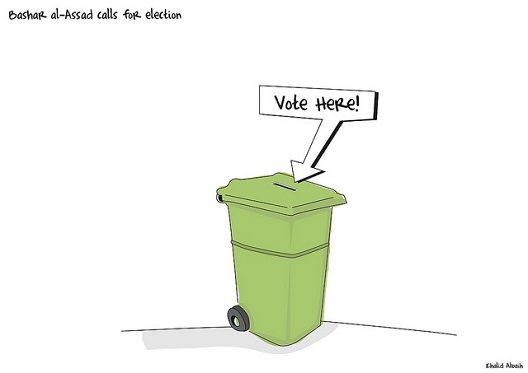 The farcical Syrian presidential election, held in the midst of a bloody civil war, is unlikely to radically alter the dynamics on the battlefield inside Syria or convince Assad’s opponents of his democratic legitimacy. However, it would be a dangerous miscalculation to dismiss its significance; a mistake Secretary of State John Kerry recently committed in Beirut.
The farcical Syrian presidential election, held in the midst of a bloody civil war, is unlikely to radically alter the dynamics on the battlefield inside Syria or convince Assad’s opponents of his democratic legitimacy. However, it would be a dangerous miscalculation to dismiss its significance; a mistake Secretary of State John Kerry recently committed in Beirut.
The election results, though by no means a surprise to anyone, are already being exploited by Russia, China, Iran, and Hezbollah to publicly underscore the continued legitimacy, power, and popularity of Assad. Their statements of support for the election’s results were followed by proposals for a political settlement to the crisis. Although this is not a new development, Assad’s allies now share the view that they have the upper hand in the negotiations, and are thus issuing their own terms for the settlement. In Friday’s speech, an emboldened Nasrallah claimed that after the elections, “a political solution in Syria can [no longer] be based on Geneva I and II…no one can override a vote which showed the whole world that the political solution begins and ends with Assad.”
The importance that Assad and his allies placed on these elections provokes two questions. First, why did they feel the need to confirm Assad’s legitimacy via elections that they, as the only actors allowed to be present, know more than anyone else to be a farce? Given that Assad does not seem to be particularly concerned with heeding the will of his people, and more importantly, he has been winning militarily, it is curious that he and his allies chose to trouble themselves with elections. And second, in terms of practical implications, how will the election’s results change the dynamics of a political settlement on the world stage? It is important to understand the ‘why’ as independent from the ‘how.’
The elections demonstrate the primacy that Assad’s allies place on the language of legitimacy, and its corollaries, the principles of state sovereignty and non-interference. For Russia and China in particular, their policies in Syria have been a manifestation of these notions rather than an attachment to the Assad regime. Russia’s UN Ambassador, Vitaly Churkin, has frequently cited his country’s rejection of external involvement in Syrian domestic affairs as the reason behind its Security Council vetoes. Interestingly, throughout most of 2012 and the beginning of 2013, Russia was working with the West to find a political solution to the crisis, refraining from signing any new arms deals with Assad. This demonstrates that the Russians are not as invested in the Assad regime as much as they are seeking to control the practice and norms by which any transition can take place.
In the same vein, China distrusts the West’s foreign policy agenda and fears endowing it with the power to engineer democratic transitions that the West could eventually employ on issues vital to China’s national security interests, such as Tibet. Russia and China have been consistent in their foreign policies regarding non-interference. They have both vocally regretted their abstention over Resolution 1973, which authorised the NATO mission in Libya, specifying this operation as an example of the West stretching its mandate to achieve its own political objectives.
Thus, by staging an election, Assad’s allies can continue to pretend that he is the legitimate representative of the Syrian people and defend the norms of sovereignty and non-interference that democratic legitimacy entails.
The practical implications of the election’s results on the world stage will manifest on two platforms. The first is the UN Security Council. Given that Russia and China, two veto powers, have reconfirmed Assad’s legal standing, they are now less likely to allow any resolution on Syria to pass without the host country’s consent. This obstruction will make transitional and international criminal justice almost impossible; it will continue to hinder the delivery of humanitarian assistance to the parts of Syria outside the regime’s control; it will protect the regime from effective multilateral sanctions; and it will ensure that no decisive, forcible action can be taken to counter the regime’s atrocities.
The second platform on which the consequences of the election will be evident is the negotiating table. Geneva II was convened on the cornerstone of the Geneva Communiqué, which Russia signed, identifying the formation of a transitional body including members of the government and the opposition as the first step in any political settlement. The mere presence of Assad’s regime at Geneva II signifies its tacit understanding that there is an organized opposition and that, at some point, the regime is going to have to compromise.
Today, the situation is vastly different. Assad’s re-election has widened the disparity between the negotiating parties. The Assad regime can now claim to be the only legitimate government in Syria, supported by an overwhelming majority of the population, while the opposition is at best a disgruntled minority, and at worst, a group of foreign-funded terrorists. This shift in the power dynamics was aptly demonstrated by Nasrallah’s claim that one of the preconditions for any negotiations is the international community’s acceptance of Assad as president. Russia, Iran, and China will likely share that view, rendering the Geneva Communiqué a relic of a distant time.
Aya Majzoub is an independent Middle East analyst focusing on post-conflict reconstruction and democratization. She has previously interned at the Project on Middle East Democracy and the Middle East Institute. She graduated from the University of Cambridge where she concentrated on politics and international studies.
Image: (Photo: Flickr/Khalid Albaih)
